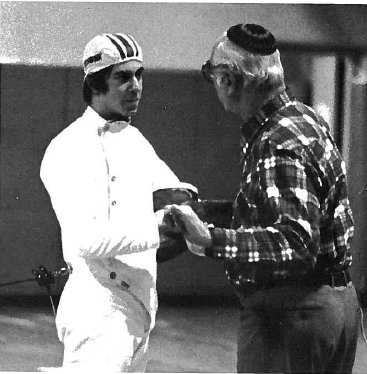| Arthur
Tauber: Reminiscences of a Mentor
Jerome
A. Chanes
Yeshiva University,
New York
22nd
June, 2008
Celebrating the life and works of a friend is a great joy; celebrating
and honoring the contributions of a teacher is a universal joy.
Arthur
Tauber was more than my friend for lo these many years, and more than
merely a teacher—although he certainly was those things. He was
one of a few individuals in my life whom I would characterize as mentor.
I remember well the conversations Arthur and I had twenty-five years
ago—twenty years after I had fenced for Yeshiva—in a time
when I was stumbling around the borders of a career that had one foot
in the public-policy world, one foot in academia. Tauber the teacher—my
coach nonpareil—came together at that crucial time with Tauber
the friend. Arthur was once again my mentor.
At
one level—elemental, basic—Coach Tauber taught me, to be
sure, the mechanics and techniques of fencing—and Coach was a
great fencer, and he was a great teacher, a demanding teacher. His lessons
were models of pedagogy. At another level, Tauber taught us that fencing
is a sport that is developed and matured more above the neck than below;
it demanded that you use what you have upstairs; it required a sharpening
and mastery of analytical skills. And then there was discipline—no
small matter for one in whose vocabulary the word “discipline”
might very well have been in Swahili.
Beyond these, Arthur Tauber represented for me the realization of what
the Classical Greeks called the ideal of “arête”—my
rebbe Louis Feldman will be proud of me—usually, and imperfectly,
translated as “virtue,” or better, “excellence.”
I know of few people to whom “excellence” meant more than
it does to Arthur. But it’s means more than “excellence”
in a particular skill; it is all-around excellence, a respect for the
wholeness of the human being and of life; it was and is the whole man.
And
this is what Arthur Tauber is all about, and this is the person we are
celebrating today—the whole person in the pursuit of excellence,
and the truly decent human being. And, in a curious way, Arthur Tauber
represented in his own way the old Yeshiva University ideal of Torah
U’madda, unfortunately gone missing in the YU of the twenty-first
century—the idea that traditional religious studies and secular
studies and activities are not in conflict but in fact enhance one another.
Not to put too fine a point on it, but Tauber was entirely comfortable
with this kind of notion. He and I discussed it at length.
Arthur Tauber gives new meaning to the words of the Bavli, “The
place of a person does not honor that person; but the person gives honor
to his place.” “Ein m’komo shel adam m’chabdo,
ella ha’adam m’chabed es m’komo.” Arthur Tauber
gives honor to this place, and to us. |
